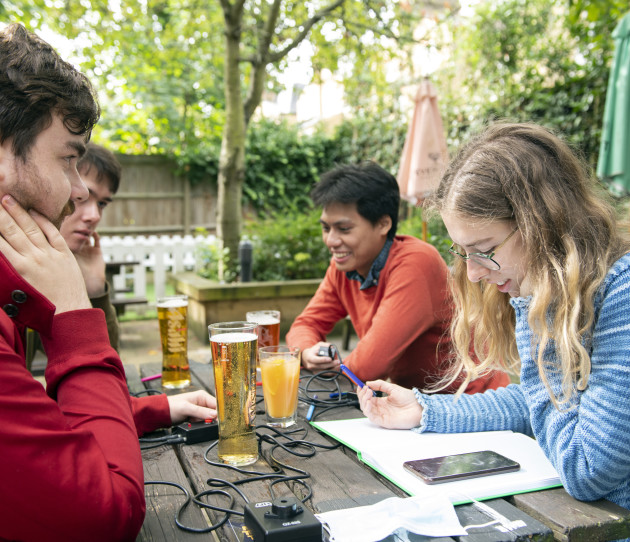Starter for ten: Imperial College Quiz Society
From the local pub to the bright lights of University Challenge, Imperial quizzers show some impressive feats of knowledge.
Words: Helena Pozniak / Photography: Hannah Maule-ffinch
 When Jeremy Paxman declared Imperial the champions of University Challenge last April, there was one audience member who was particularly satisfied – and relieved. As outgoing chair of the Imperial College Quiz Society, Susan Rutter (MSci Mathematics, Third Year) had a personal interest in the team’s success – which is why, when it came to it, she could barely watch. “I’d run a mile rather than actually compete on air,” she says. “At the last recording, I just sat in the audience squeezing my neighbour’s arm too tightly.”
When Jeremy Paxman declared Imperial the champions of University Challenge last April, there was one audience member who was particularly satisfied – and relieved. As outgoing chair of the Imperial College Quiz Society, Susan Rutter (MSci Mathematics, Third Year) had a personal interest in the team’s success – which is why, when it came to it, she could barely watch. “I’d run a mile rather than actually compete on air,” she says. “At the last recording, I just sat in the audience squeezing my neighbour’s arm too tightly.”
University quiz teams are famous for their geekery and their oatmeal jumpers. Team members – usually male – display weird depths of knowledge, impressively swift recall, and are occasionally floored by popular culture. The odd fist pump after a correct answer is as racy as it gets. Add cameras, bright lights and Paxman, and you’ve got an adrenaline rush like no other.
 But it’s not all glamour. Imperial College Quiz Society offers contests for every taste, from arcane academic knowledge to popular culture, and revels in the traditional pub-quiz challenge as much as the high-profile events. “We tell newcomers that it really doesn’t matter if you get questions wrong now and again,” says Rutter, who joined the society keen to try her hand at inter-university competitions and to sharpen her reactions.
But it’s not all glamour. Imperial College Quiz Society offers contests for every taste, from arcane academic knowledge to popular culture, and revels in the traditional pub-quiz challenge as much as the high-profile events. “We tell newcomers that it really doesn’t matter if you get questions wrong now and again,” says Rutter, who joined the society keen to try her hand at inter-university competitions and to sharpen her reactions.
“Pub quizzes are more about random knowledge – what we call ‘old men’s knowledge’. We go along for the social. But, underneath it all, students at Imperial care a lot about being smart, and being perceived as knowing things. That’s the premise of this hobby.”
There are different approaches to absorbing facts. “Personally, I like finding out what I know and whether I can apply my knowledge in different ways,” says Rutter, a mathematician with an in-depth knowledge of late nineteenth-century Impressionism. She’ll browse Wikipedia and even BBC Bitesize, following her own interests. “Some people are naturally just good and fast and know things. Some like to systematically look things up. I know someone who spends two hours a day memorising facts from flashcards so he can improve.”
 But when it comes to the biggest quizzes, everyone gets stage fright. Imperial doesn’t necessarily outperform on science questions at university level, says Rutter. “Sometimes the hardest questions to answer can be on your own subject. Everyone is staring at you and you just have no idea. I’m a mathematician but I had to get a chemist to sit next to me to answer the most simple maths question.”
But when it comes to the biggest quizzes, everyone gets stage fright. Imperial doesn’t necessarily outperform on science questions at university level, says Rutter. “Sometimes the hardest questions to answer can be on your own subject. Everyone is staring at you and you just have no idea. I’m a mathematician but I had to get a chemist to sit next to me to answer the most simple maths question.”
Quiz teams are often mainly male, which is why Rutter was keen to take the chair this year. “I hate to recognise that an aspect of knowledge is ‘gendered’. You get a question on feminist literature and you see three male teammates turn to their one female member. I hope we can change that.”
People quiz because “learning new stuff is fun”, she says. “I think everyone at Imperial genuinely enjoys finding out new things. It is nerdy. But, in a sense, everyone at Imperial is nerdy.”